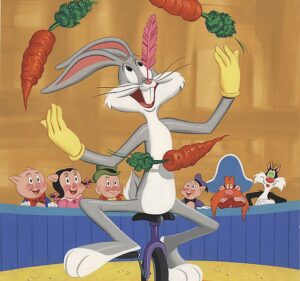Michael Gelb celebrates the power of play as our most effective way to learn.
Most widely known, perhaps, for his best-selling book, How To Think Like Leonardo da Vinci, which has been translated into 24 languages, Gelb is the author of a number of other books and a pioneer in the fields of accelerated learning, creative thinking, and leadership development. It may surprise you to learn that, in what he teaches, the art of juggling plays a central role. Learning how to juggle, both literally and metaphorically, enables everyone to become better at what they do—in business, learning, and life.
Gelb first got excited about juggling as he watched a professional juggler and suddenly saw that the three balls, as they wove a pattern in the air, traced the symbol for infinity: ∞

To his friend standing beside him, Gelb exclaimed, “Look: the infinity symbol! He’s holding infinity in his hands!” This so inspired him that he decided at that very moment to become a juggler himself so that he could master the infinity pattern.
Gelb was familiar with the famous opening lines of a William Blake poem:
To see a world in a grain of sand
and heaven in a wild flower,
hold infinity in the palm of your hand
and eternity in an hour.
Juggling had suddenly given him a delightful new twist on this and, over time, Gelb took the art of juggling and developed it into a powerful metaphor for the art of learning and the art of living.

Although juggling may at first glance seem next to impossible, it is easy to learn and open to everyone—regardless of gender, or whatever your age, you can become a good juggler.
Once you have learned to juggle, juggling can be a “moving meditation” that you can use to relax and focus the mind while energizing and balancing the body. As Gelb says, “the ambidextrous movement feels good and helps coordinate the two sides of the brain and body.” Ambidexterity, facility of use with both the right and left hands, is a natural outcome of juggling and, as the art is refined through practice, ambidexterity becomes global, to include the whole living system, physical and mental.
With practice, you will begin to enter the “juggling flow state,” where throwing and catching the balls becomes effortless; the juggling seems to happen all by itself as the three balls cascade in the air, weaving and reweaving the pattern of infinity. In the process of flow, what before may have seemed hopelessly complex is now simplicity itself. At such times you will deeply experience the clarity, joy, and poise of optimal performance.
Maybe most important of all: juggling is simply fun! And through this lighthearted activity you enter into the realm of play, one of the most fundamental learning modalities.
Language shows that the Greeks have always known that the secret of learning is to be found in play. As Gelb points out, “Their words for play (paida) and education (paideia) are slight variations on the same theme.” And the word “juggler”derives from the Latin word joculari, meaning “to joke or to jest.”
HyC